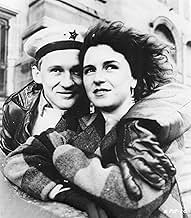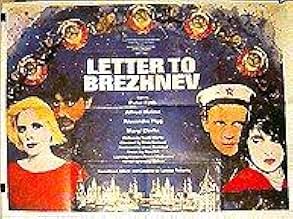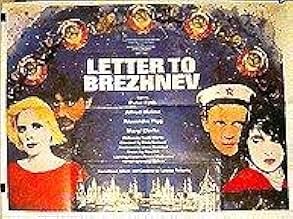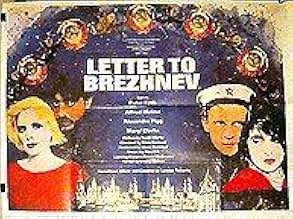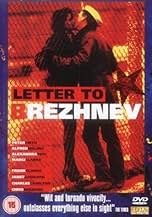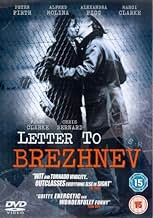AVALIAÇÃO DA IMDb
6,7/10
1,7 mil
SUA AVALIAÇÃO
Adicionar um enredo no seu idiomaTwo Soviet sailors meet Liverpool girls during a shore leave. Peter falls for Elaine but must leave with his ship. Missing him, she writes to Brezhnev hoping to reunite.Two Soviet sailors meet Liverpool girls during a shore leave. Peter falls for Elaine but must leave with his ship. Missing him, she writes to Brezhnev hoping to reunite.Two Soviet sailors meet Liverpool girls during a shore leave. Peter falls for Elaine but must leave with his ship. Missing him, she writes to Brezhnev hoping to reunite.
- Indicado para 1 prêmio BAFTA
- 2 vitórias e 1 indicação no total
Tracy Marshak-Nash
- Tracy
- (as Tracy Lea)
Avaliações em destaque
A multifaceted film about two English working class girls (Teresa and Elaine) and two Russian sailors (Peter and Sergei).
In the first half two couples spent a night together. Teresa and Sergei go for the plain vanilla one night stand. Elaine and Peter keep it Platonic, but in so doing get to know each other much better. After all it is Elaine who has the hardest time when the sailors have to get back on board again.
The second half revolves around the relationship of the two friends Elaine and Teresa. This relationship has much in common with the relationship between Elin and Agnes in "Show me love" (1998, Lukas Moodysson). Teresa (Elin) does have the bigger mouth, but Elaine (Agnes) is the one with more guts.
Between the lines the second half is also a little bit of a political satire. There are more films in which romances are disturbed by "big politics" ("The unbearable lightness of being", 1988, Philip Kaufman), but a romance resulting in a girl contemplating an emigration to the Soviet Union is quite new.
In this respect the film is very characteristic of the 80s. The Cold war was passed his prime, in fact (with hinsight) the Soviet Union was nearly dead. On the other hand in England it was the time of the Thatcher years with budget cuts that did hit the Northern part of England (the movie plays in Liverpool) disproportionately hard.
Just like in "Show me love" there is one scene in "Letter to Brezhnev" that is very characteristic of the relation between the two friends. In "Show me love" the relation between Elin and Agnes is defined in the "toilet scene". In "Letter to Brezhnev" the bar scene is equally important. On a given moment Elaine is captivated by doubt if she should go to Russia. She goes outside to make up her mind. When she comes back she orders two wodka's for Teresa and herself. She has made a decision!
In the first half two couples spent a night together. Teresa and Sergei go for the plain vanilla one night stand. Elaine and Peter keep it Platonic, but in so doing get to know each other much better. After all it is Elaine who has the hardest time when the sailors have to get back on board again.
The second half revolves around the relationship of the two friends Elaine and Teresa. This relationship has much in common with the relationship between Elin and Agnes in "Show me love" (1998, Lukas Moodysson). Teresa (Elin) does have the bigger mouth, but Elaine (Agnes) is the one with more guts.
Between the lines the second half is also a little bit of a political satire. There are more films in which romances are disturbed by "big politics" ("The unbearable lightness of being", 1988, Philip Kaufman), but a romance resulting in a girl contemplating an emigration to the Soviet Union is quite new.
In this respect the film is very characteristic of the 80s. The Cold war was passed his prime, in fact (with hinsight) the Soviet Union was nearly dead. On the other hand in England it was the time of the Thatcher years with budget cuts that did hit the Northern part of England (the movie plays in Liverpool) disproportionately hard.
Just like in "Show me love" there is one scene in "Letter to Brezhnev" that is very characteristic of the relation between the two friends. In "Show me love" the relation between Elin and Agnes is defined in the "toilet scene". In "Letter to Brezhnev" the bar scene is equally important. On a given moment Elaine is captivated by doubt if she should go to Russia. She goes outside to make up her mind. When she comes back she orders two wodka's for Teresa and herself. She has made a decision!
Taking place during the 'Cold War' the film describes two people falling in love during a time of massive unemployment and recession in the U.K. The main characters are Elaine and Theresa, two friends who are very different from each other. Elaine is unemployed, bored of her own life and the people around her. Theresa works in a chicken factory and is the opposite of Elaine – she tries to enjoy life, in her own way which involves drinking, having casual sex and taking opportunities when they arise. Elaine and Theresa meet two Russian sailors in a nightclub and Elaine falls in love with the shyer one – Peter – and after he gets back on his ship she decides to go to Communist Russia to be with him, but it doesn't seem so easy to do. In the 1980's there was a big difference between the countries on either side of the 'Iron Curtain'. There was seen to be more freedom in the Capitalist West than the Communist East.
The film shows the negative side of the lives of independent, 'free' women in the West; it tries to show that life in the West at that time was not what we are led to believe. Although we do not see life in Russia in the film, we are told there is work for all people there. For Elaine, Russia represents a happy life, a new start and hope for a job and a family. The film also shows the attitudes of the British to Russia, where they say there is no freedom and that Elaine may lose the opportunity to come back to her country. In my opinion, this film is propaganda for Russia as the director shows us the way that the British government constructed their own propaganda against Russia. Throughout the film the director shows us why life in the U.K. is no better, or may be worse, than life in Russia. We don't know if Elaine will be happier in Russia but she will have followed her heart and dreams.
The film shows the negative side of the lives of independent, 'free' women in the West; it tries to show that life in the West at that time was not what we are led to believe. Although we do not see life in Russia in the film, we are told there is work for all people there. For Elaine, Russia represents a happy life, a new start and hope for a job and a family. The film also shows the attitudes of the British to Russia, where they say there is no freedom and that Elaine may lose the opportunity to come back to her country. In my opinion, this film is propaganda for Russia as the director shows us the way that the British government constructed their own propaganda against Russia. Throughout the film the director shows us why life in the U.K. is no better, or may be worse, than life in Russia. We don't know if Elaine will be happier in Russia but she will have followed her heart and dreams.
I first saw this film when it came out and just fell in love with it. I cannot say why either, it just has a magical quality that draws you in. The setting obviously helps, Liverpool is a beautiful city, architecturally and spiritually and you get lavish helpings of both. The performances from the four lead actors are flawless to me, just the right balance of comedy and pathos, with special mention to Margi Clarke, whose brassy exterior hides a tenderness which she allows to shine through every so often.(As an aside I saw her do stand up once at Band on the Wall in Manchester, and boy was she rude!) I've seen comments on the boards saying people enjoyed it when it first came out, but now find it a bit ridiculous, and I can only totally disagree with them. I still watch this film at least a couple of times a year and never tire of it. If you haven't seen this gem, I can only suggest you get the DVD as soon as possible, and enjoy a film that exudes true human warmth.
Living and working in Liverpool in the mid 1980s I first watched this cheeky rom-com just after its release. Yes, it was and still is hilarious and yes, it does portray life in the city at that time, hard, depressing and at times, strangely uplifting.
I've just watched it again and although somewhat dated - hairstyles, clothes (not Margi Clarke's magnificent, timeless red dress) and of course much of the city which is correctly shown as run-down, drab and frankly, awful during its '80s nadir; its the spirit of the Scousers that always gets them through, then and now.
That legendary resilience is personified by Elaine (Alexandra Pigg) a pretty, girl-next door dreamer who somehow has to escape her life and surroundings. Ably assisted by her friend Teresa (Margi Clarke) they embark on a night out in town where amongst other wild activities they meet two Russian sailors in a club. Elaine is completely smitten with Peter (Peter Firth) and Teresa goes along for the ride with Sergei (Alfred Molina) in a manner of speaking...
The humour is harsh, sarcastic and 100% Scouse. The scenes between Clarke and Molina are the stuff of legend - realistic just doesn't do them both justice. Meanwhile, Elaine and Peter are falling in love. After a night of passion and a certain amount of philosophy there is another memorable scene when Elaine and Peter depart at the dockside as the boys have to leave for the Soviet Union.
Desperately in love, tetchy and lonely she decides on what seems a ridiculous scheme to re-unite with Peter. I found myself rooting for her, as I did almost 40 years ago. It's the girl's sheer guts that I admire the most about the film. She has little going for her as she runs up against the objections of her family, friends and the establishment. But she still has Teresa to help her an achieve her dream. Wonderful.
I've just watched it again and although somewhat dated - hairstyles, clothes (not Margi Clarke's magnificent, timeless red dress) and of course much of the city which is correctly shown as run-down, drab and frankly, awful during its '80s nadir; its the spirit of the Scousers that always gets them through, then and now.
That legendary resilience is personified by Elaine (Alexandra Pigg) a pretty, girl-next door dreamer who somehow has to escape her life and surroundings. Ably assisted by her friend Teresa (Margi Clarke) they embark on a night out in town where amongst other wild activities they meet two Russian sailors in a club. Elaine is completely smitten with Peter (Peter Firth) and Teresa goes along for the ride with Sergei (Alfred Molina) in a manner of speaking...
The humour is harsh, sarcastic and 100% Scouse. The scenes between Clarke and Molina are the stuff of legend - realistic just doesn't do them both justice. Meanwhile, Elaine and Peter are falling in love. After a night of passion and a certain amount of philosophy there is another memorable scene when Elaine and Peter depart at the dockside as the boys have to leave for the Soviet Union.
Desperately in love, tetchy and lonely she decides on what seems a ridiculous scheme to re-unite with Peter. I found myself rooting for her, as I did almost 40 years ago. It's the girl's sheer guts that I admire the most about the film. She has little going for her as she runs up against the objections of her family, friends and the establishment. But she still has Teresa to help her an achieve her dream. Wonderful.
Frank Clarke is my favourite writer of British Films (Letter To Brezhnev, Blonde Fist, and I have just found out The Fruit Machine.) The film is set in Modern day working class Liverpool, where two friends Teresa (the one and only Margi Clarke) and Elaine (Alexandra Pigg) hit the town one night and meet two Russian Sailors. Elaine falls head over heels in love and when the sailors set sail Elaine writes a letter to president Brezhnev of Russia regarding her love and the need to see him again as she believes she is being prevented by the British authorities. It is not however a soppy love story, fast paced and again quite true to working class life in Britain in the 1980's. A Film Four production again, who have made the best low budget British Films of the last twenty years.
Você sabia?
- CuriosidadesAlexandra Pigg and Peter Firth are married in real life.
- Erros de gravaçãoElaine says the British embassy did nothing to help her. It is highly unlikely that that she as a British citizen in Britain would have contacted any British embassy, all of which would, by definition, be in other countries. She would have contacted the Foreign Office, which is the authority dealing with foreign affairs and international matters in Britain. The casual viewer might easily confuse the two, but Elaine, who has recently dealt with them, would not make this mistake.
- Cenas durante ou pós-créditosThe end credits roll to the background of a painted Moscow city landscape.
- ConexõesFeatured in At the Movies: Desert Hearts/Mona Lisa/Letter to Brezhnev (1986)
- Trilhas sonorasAlways Something There To Remind Me
Written by Burt Bacharach and Hal David
Performed by Sandie Shaw
(uncredited)
Principais escolhas
Faça login para avaliar e ver a lista de recomendações personalizadas
- How long is Letter to Brezhnev?Fornecido pela Alexa
Detalhes
- Data de lançamento
- País de origem
- Idioma
- Também conhecido como
- Letter to Brezhnev
- Locações de filme
- Empresas de produção
- Consulte mais créditos da empresa na IMDbPro
Bilheteria
- Orçamento
- £ 400.000 (estimativa)
Contribua para esta página
Sugerir uma alteração ou adicionar conteúdo ausente


